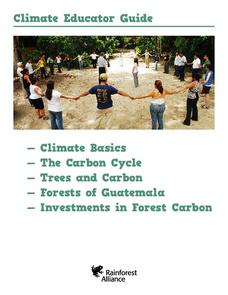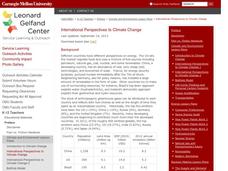NOAA
Lost City Chemistry Detectives
In 1977, scientists discovered hot springs in the middle of deep, cold ocean waters near the Galapagos Islands. Scholars research the chemical reactions that explain what scientists found at the Lost City. A discussion connects many...
NOAA
Ocean Acidification
If tap water is more acidic than ocean water, why are we so concerned about ocean acidification? The third installment of a 23-part NOAA Enrichment in Marine sciences and Oceanography (NEMO) program focuses on carbon dioxide levels in...
Howard Hughes Medical Institute
The Day the Mesozoic Died
While this is not the traditional, step-by-step lesson plan, it is chock-full of material that you can easily incorporate into your earth history unit. Its main purpose is to serve as a guide to using a three-part film, The Day the...
Nevada Outdoor School
Let It Snow! Let It Melt!
Winter weather offers a great opportunity to teach young scientists about the states of matter. This activity-based lesson includes a range of learning experiences, from experimenting with the rate at which ice melts to singing a song...
NOAA
An Ocean of Energy
Young biologists trace the path of the sun's energy through marine ecosystems in the second part of this four-lesson plan series. Building on prior knowledge about producers, consumers, and decomposers students are introduced to the...
Purdue University
Design of a Canal for a New Water Park in Lafayette
Erosion is no match for our canals. Learners first perform experiments to test the amount of erosion for different materials and different slopes. Based on the results, they design ditches or canals that carry water from one location to...
Education Outside
Our Water Planet
Fresh water is a precious resource. Most kids don't realize how little of the water on Earth is actually drinkable. This lesson will help to illuminate them on this important topic. They discus the ratio of water to land, where most...
Centers for Ocean Sciences
Ocean and Great Lakes Literacy: Principle 1
Is your current lesson plan for salt and freshwater literacy leaving you high and dry? If so, dive into part one of a seven-part series that explores the physical features of Earth's salt and freshwater sources. Junior hydrologists...
Rainforest Alliance
Climate Educator Guide
Climate change is a hot topic in the news. Class members examine carbon dioxide data to analyze trends of our atmospheric makeup over time. They also discuss climate and climate change, and determine how these changes are affecting life...
Science 4 Inquiry
Phases of the Moon
The moon takes just over 27 days to orbit around Earth. Young scientists position themselves as the earth as they rotate around the sun and hold the moon. This allows them to observe the patterns and phases of the moon.
Carnegie Mellon University
International Perspectives to Climate Change 1
After a lecture about how the first industrial revolution triggered the path to climate change, your environmental studies class discusses what the impacts are. In a culminating activity, they get into groups and identify countries on a...
SRI International
Nanofiltration
How can everyone in the world have access to clean drinking water? Throughout the lesson plan, learners read about and listen to how water is filtered, what the filtration process removes, and the best ways to filter. They explore the...
Science Matters
A Model of Plate Faults
The San Andreas fault is one of the longest fault zones in the world. In a series of 20 lessons, the fourth lesson has pupils use a paper model to recreate various types of plate faults. Each is held in position then drawn into a science...
NASA
Natural Resources on Earth
Natural resources do not always occur so naturally. Lead classes through a thorough set of lessons investigating the natural resources important for plants. Learners complete a series of worksheets as they explore the information and...
Carnegie Mellon University
Bathtub Model
Using a colorful infographic handout and a guide sheet, hold a class discussion about how a bathtub can serve as a model for the greenhouse effect created by Earth's atmosphere. Participants will understand that as energy or matter is...
Curated OER
Water in the Biosphere
Environmental explorers examine the campus and take note of living organisms. Introduce them to the biosphere and the questions of the day: How much water can be found in the biosphere? A slide show helps you along, and even contains a...
Carnegie Mellon University
Introduction to Climate
Begin a full lesson on climate change by demonstrating how carbon dioxide gas contributes to increased temperatures. Be aware that pressure inside the antacid-containing bottle in Activity 2 may cause the lid to fly off; keep viewers at...
Wild BC
Is Climate Change Good for Us?
Is it really that big of a deal if the global climate undergoes a little change? Young environmentalists consider this very question as they discuss in small groups the impact of different climate change scenarios on their lives, their...
NOAA
Sediments
Calcareous ooze ... what an interesting name! The 15th installment of a 23-part NOAA Enrichment in Marine sciences and Oceanography (NEMO) program focuses on sediments found on the ocean floor. After viewing the slideshow lecture,...
NOAA
Currents
Learn how ocean currents are vital to humans and marine life. The eighth installment of a 23-part NOAA Enrichment in Marine sciences and Oceanography (NEMO) program, focuses on ocean currents and how they affect global climate. The...
PBS
Experience a Solar Eclipse
Didn't catch the last solar eclipse? Now every day can be eclipse day, thanks to an interactive lesson plan from PBS' Space series for middle schoolers! The well-rounded multi-media experience includes video clips, an interactive, and...
PBS
Why Isn't There an Eclipse Every Month?
Searching for an eclipse activity that sends scholars over the moon? Try an interesting interactive to get their minds active! The resource, part of an extensive Space series from PBS Learning Media, uses modeling and data analysis to...
NOAA
Oceans of Energy
Are the earth's oceans really just giant batteries, waiting for their energy to be harnessed? Middle school mechanical engineers will be shocked by the amazing amount of energy that forms around them after diving into part four of a...
Energy for Keeps
The Energy Times
Extra! Extra! Read all about past and present energy use in a classroom-made historical newspaper. Useful as a cross-curricular assignment between science, history, and language arts, the project is sure to get young journalists...
Other popular searches
- Earth Science Moon Phases
- Branches of Earth Science
- Earth Science Minerals
- Earth Science Inquiry
- Earth Science Lesson
- Earth Science Lesson Plans
- Basic Earth Science
- And Earth Science
- Earth Science Map Reading
- Earth Science and Art
- Earth Science Vocabulary
- Science Earth Layers

























